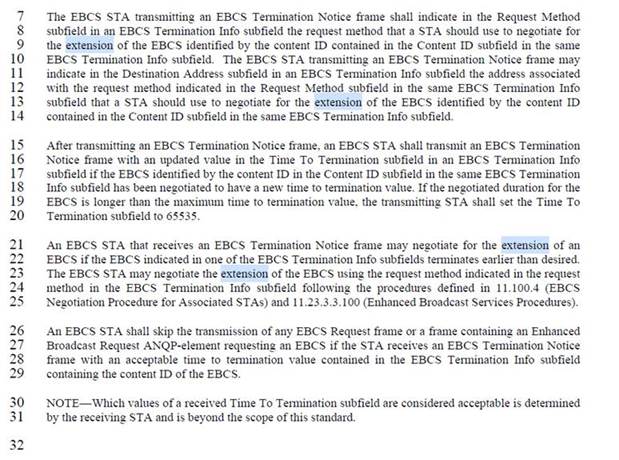Hi Abhishek and all,
As we discussed in the last teleconference, Abhishek suggested to rename the newly added subfield “Requested Time To Termination subfield” by “request to extend subfield” or “request
for service subfield”.
I am open to this suggestion, and I think it doesn’t matter what the name is. Because the “Requested Time To Termination subfield” is used to indicate the number of beacon intervals
during which transmission of the EBCS traffic stream identified in the Content ID subfield is requested.
So I'm here to ask for everyone's opinions. Do we need to change the name?
Thanks for providing your feedback.
Hi Mark and all,
Attached please find the proposal titled “Text Proposal for EBCS Request ANQP-element”, which we had discussed in the last teleconference.
I noticed that the contribution “11-21-0948-00-00bc-ebcs-arch-types-of-traffic” discussed four EBCS Traffic Categories.
However, our newly added Clause 11.100.5 just aim to discuss the EBCS negotiation procedure for unassociated STAs with ANQP-element.
After integrating Stephen’s short sentences, I think this document is ready for motion.
In addition, I would be grateful if
anyone could provide some suggested text to make the content of
Clause 11.100.5
more complete.
Thanks!
Best regards,
Pei Zhou
发件人:
周培(Zhou Pei)
发送时间: 2021年6月9日 21:29
收件人: Stephen McCann <mccann.stephen@xxxxxxxxx>
抄送: STDS-802-11-TGBC@xxxxxxxxxxxxxxxxx
主题: 答复: [STDS-802-11-TGBC]
答复: Discussion on EBCS Request ANQP-element
Hi Stephen,
Thank you so much for your suggestions.
Best regards,
Pei Zhou
发件人: Stephen McCann <mccann.stephen@xxxxxxxxx>
发送时间: 2021年6月9日
20:44
收件人: 周培(Zhou Pei) <zhoupei1@xxxxxxxx>
抄送:
STDS-802-11-TGBC@xxxxxxxxxxxxxxxxx
主题: Re: [STDS-802-11-TGBC]
答复: Discussion on EBCS Request ANQP-element
Pei Zhou,
thank you. I've added a couple of short sentences to the enclosed document that I've also highlighted in yellow.
Kind regards
Stephen
On Tue, 8 Jun 2021 at 16:35, 周培(Zhou Pei) <00001462c7c6c67a-dmarc-request@xxxxxxxxxxxxxxxxx> wrote:
Dear all,
Attached please find my contribution titled “Text Proposal for EBCS Request ANQP-element” we just discussed.
Note: some addressed comments of R2 are deleted.
I really welcome everyone to provide comments and suggested content, since I am not familiar with the EBCS system architecture.
Thank you!
Best regards,
Pei Zhou
发件人: 周培(Zhou Pei)
发送时间: 2021年5月28日 17:55
收件人: Mark Rison <m.rison@xxxxxxxxxxx>; STDS-802-11-TGBC@xxxxxxxxxxxxxxxxx
抄送: HUANG LEI <huang.lei1@xxxxxxxx>
主题: 答复: Discussion on EBCS Request ANQP-element
Hi Mark,
Thanks for your further comments.
Attached please find the revised doc.
Best regards,
Pei Zhou
发件人: Mark Rison <m.rison@xxxxxxxxxxx>
发送时间: 2021年5月28日 16:54
收件人: 周培(Zhou Pei) <zhoupei1@xxxxxxxx>; STDS-802-11-TGBC@xxxxxxxxxxxxxxxxx
主题: RE: Discussion on EBCS Request ANQP-element
Thanks, Pei. My further comments attached.
Mark
--
Mark RISON, Standards Architect, WLAN English/Esperanto/Français
Samsung Cambridge Solution Centre Tel: +44 1223 434600
Innovation Park, Cambridge CB4 0DS Fax: +44 1223 434601
ROYAUME UNI WWW: http://www.samsung.com/uk
From: ** STDS-802-11-TGbc -- Enhanced Broadcast Service ** <STDS-802-11-TGBC@xxxxxxxxxxxxxxxxx> On Behalf Of ??(Zhou Pei)
Sent: Friday, 28 May 2021 03:03
To: STDS-802-11-TGBC@xxxxxxxxxxxxxxxxx
Subject: [STDS-802-11-TGBC] 答复: Discussion on EBCS Request ANQP-element
Hi Abhi,
Thanks for your comments and suggestions!
I added some content according to your comments, please refer to the attached doc.
Please let me know if you have further comments.
Best regards,
Pei Zhou
发件人: Abhishek Patil <appatil@xxxxxxxxxxxxxxxx>
发送时间: 2021年5月28日 1:25
收件人: 周培(Zhou Pei) <zhoupei1@xxxxxxxx>; STDS-802-11-TGBC@xxxxxxxxxxxxxxxxx
主题: RE: Discussion on EBCS Request ANQP-element
Hi Pei,
Thank you for your contribution.
I am still concerned about security. I don’t have a clear solution yet.
I have a few comments/suggestions embedded in the attached doc.
Could you please take a look?
Regards,
Abhi
From: ** STDS-802-11-TGbc -- Enhanced Broadcast Service ** <STDS-802-11-TGBC@xxxxxxxxxxxxxxxxx> On Behalf Of ??(Zhou Pei)
Sent: Thursday, May 27, 2021 6:06 AM
To: STDS-802-11-TGBC@xxxxxxxxxxxxxxxxx
Subject: [STDS-802-11-TGBC] 答复: Discussion on EBCS Request ANQP-element
CAUTION: This email originated from outside of the organization.
Hi Mark,
Thanks for your comments.
> Thanks for the update. I attach further comments.
Attached please find a revised version based on your comments. Please let me know If you have further comments.
I would be great if you can add your suggested content into our text proposal.
> Well, 11.100.5 is about responding to a notice of termination, where
obviously what you'd want to do is to extend the session. I don't
think that means that all you can use the Requested Time To Termination
field is for extension. As I said, if that's the case, I would like
to see that stated explicitly, and I'd also like to understand why
a stream should be kept running even if no-one is listening to it.
I agree that the Requested Time To Termination subfield can be used to extend and/or shorten the EBCS services.
I think both are OK, and I didn’t put any restrictions in our text.
Best regards,
Pei Zhou
发件人: Mark Rison <m.rison@xxxxxxxxxxx>
发送时间: 2021年5月27日 19:54
收件人: 周培(Zhou Pei) <zhoupei1@xxxxxxxx>; Xiaofei.wang@xxxxxxxxxxxxxxxx; STDS-802-11-TGBC@xxxxxxxxxxxxxxxxx
抄送: HUANG LEI <huang.lei1@xxxxxxxx>
主题: RE: Discussion on EBCS Request ANQP-element
Hello Pei,
> Attached please find a revised text proposal. Some updates are made based on Mark’s comments.
> Please let me know if you have further comments or if you have additional content to be added to the text proposal, thanks!
Thanks for the update. I attach further comments.
> As for the case of using Time To Termination to extend the TTT, I found some related content in Clause 11.100.5 EBCS Termination Notice Procedure (page 58 of D1.02) attached below. I didn’t find the case of using Time To Termination request to shorten the TTT as well.
Well, 11.100.5 is about responding to a notice of termination, where
obviously what you'd want to do is to extend the session. I don't
think that means that all you can use the Requested Time To Termination
field is for extension. As I said, if that's the case, I would like
to see that stated explicitly, and I'd also like to understand why
a stream should be kept running even if no-one is listening to it.
Thanks,
Mark
--
Mark RISON, Standards Architect, WLAN English/Esperanto/Français
Samsung Cambridge Solution Centre Tel: +44 1223 434600
Innovation Park, Cambridge CB4 0DS Fax: +44 1223 434601
ROYAUME UNI WWW: http://www.samsung.com/uk
From: 周培(Zhou Pei) <zhoupei1@xxxxxxxx>
Sent: Thursday, 27 May 2021 02:53
To: Mark Rison <m.rison@xxxxxxxxxxx>; Xiaofei.wang@xxxxxxxxxxxxxxxx; STDS-802-11-TGBC@xxxxxxxxxxxxxxxxx
Cc: HUANG LEI <huang.lei1@xxxxxxxx>
Subject: 答复: Discussion on EBCS Request ANQP-element
Hi Mark and Xiaofei,
Thank you for your valuable comments and discussions.
Attached please find a revised text proposal. Some updates are made based on Mark’s comments.
Please let me know if you have further comments or if you have additional content to be added to the text proposal, thanks!
As for the case of using Time To Termination to extend the TTT, I found some related content in Clause 11.100.5 EBCS Termination Notice Procedure (page 58 of D1.02) attached below. I didn’t find the case of using Time To Termination request to shorten the TTT as well.
Best regards,
Pei Zhou
发件人: ** STDS-802-11-TGbc -- Enhanced Broadcast Service ** <STDS-802-11-TGBC@xxxxxxxxxxxxxxxxx> 代表 Mark Rison
发送时间: 2021年5月27日 3:56
收件人: STDS-802-11-TGBC@xxxxxxxxxxxxxxxxx
主题: Re: [STDS-802-11-TGBC] Discussion on EBCS Request ANQP-element
> I don’t think that in the existing spec we have discussed the case of using Time To Termination request to shorten the TTT, it has been used to extend the TTT, at least that is my impression. I suppose it is a case we can consider or we can be more specific about it in the protocol description.
Hm, I've just grepped D1.02 and I can't find anything that indicates it's
only used to extend the duration of a TS. Am I missing something?
If this is indeed the intent, then I think it definitely needs some words,
because to me it's very counter-intuitive (if there is only one subscriber
to a TS, and they've said they only need it for 5 more minutes, why would
you keep broadcasting it for the next hour?).
Thanks,
Mark
--
Mark RISON, Standards Architect, WLAN English/Esperanto/Français
Samsung Cambridge Solution Centre Tel: +44 1223 434600
Innovation Park, Cambridge CB4 0DS Fax: +44 1223 434601
ROYAUME UNI WWW: http://www.samsung.com/uk
From: ** STDS-802-11-TGbc -- Enhanced Broadcast Service ** <STDS-802-11-TGBC@xxxxxxxxxxxxxxxxx> on behalf of Mark Rison <m.rison@xxxxxxxxxxx>
Sent: Wednesday, May 26, 2021 7:26:03 AM
To: STDS-802-11-TGBC@xxxxxxxxxxxxxxxxx <STDS-802-11-TGBC@xxxxxxxxxxxxxxxxx>
Subject: Re: [STDS-802-11-TGBC] Discussion on EBCS Request ANQP-element
Thanks, Pei. I attach my comments.
Also, this mechanism has no protection against an attacker causing
premature termination of an EBCS TS by forging an EBCS req ANQP-element
with a short Requested Time To Termination, right?
Thanks,
Mark
--
Mark RISON, Standards Architect, WLAN English/Esperanto/Français
Samsung Cambridge Solution Centre Tel: +44 1223 434600
Innovation Park, Cambridge CB4 0DS Fax: +44 1223 434601
ROYAUME UNI WWW: http://www.samsung.com/uk
> -----Original Message-----
> From: ** STDS-802-11-TGbc -- Enhanced Broadcast Service ** <STDS-802-11-TGBC@xxxxxxxxxxxxxxxxx> On
> Behalf Of ??(Zhou Pei)
> Sent: Wednesday, 26 May 2021 11:25
> To: STDS-802-11-TGBC@xxxxxxxxxxxxxxxxx
> Subject: [STDS-802-11-TGBC] Discussion on EBCS Request ANQP-element
>
> Hi all,
>
> I presented a contribution titled "Text Proposal for EBCS Request ANQP-element" (doc: 11-21-0600-02-
> 00bc-text-proposal-for-enhanced-broadcast-request-anqp-element) in the last teleconference.
> Some members raised the security issue of adding Requested Time to Termination subfield to the EBCS
> Request ANQP-element, since one unassociated non-AP STA may maliciously request a long time, which
> will have negative effects on the other non-AP STAs.
> I think this issue can be solved by limiting the time duration and/or frequency of ECBS services
> requested by unassociated non-AP STAs. That is to say, the EBCS transmitter of an EBCS has the
> authority to determine the time to termination of the EBCS.
>
> Attached pleased find a revised version of my proposal. I added a new Clause 11.100.5 EBCS Negotiation
> Procedure for Unassociated STAs.
> Please let me know if you have any comment, thanks!
>
>
> Best regards,
>
> Pei Zhou
> ________________________________
> OPPO
>
> 本电子邮件及其附件含有OPPO公司的保密信息,仅限于邮件指明的收件人使用(包含个人及群组)。禁止任何人在未经授权的情况
> 下以任何形式使用。如果您错收了本邮件,请立即以电子邮件通知发件人并删除本邮件及其附件。
>
> This e-mail and its attachments contain confidential information from OPPO, which is intended only for
> the person or entity whose address is listed above. Any use of the information contained herein in any
> way (including, but not limited to, total or partial disclosure, reproduction, or dissemination) by
> persons other than the intended recipient(s) is prohibited. If you receive this e-mail in error,
> please notify the sender by phone or email immediately and delete it!
>
> ________________________________________________________________________
> To unsubscribe from the STDS-802-11-TGBC list, click the following link:
> https://listserv.ieee.org/cgi-bin/wa?SUBED1=STDS-802-11-TGBC&A=1
________________________________________________________________________
To unsubscribe from the STDS-802-11-TGBC list, click the following link: https://listserv.ieee.org/cgi-bin/wa?SUBED1=STDS-802-11-TGBC&A=1
To unsubscribe from the STDS-802-11-TGBC list, click the following link: https://listserv.ieee.org/cgi-bin/wa?SUBED1=STDS-802-11-TGBC&A=1
To unsubscribe from the STDS-802-11-TGBC list, click the following link: https://listserv.ieee.org/cgi-bin/wa?SUBED1=STDS-802-11-TGBC&A=1
To unsubscribe from the STDS-802-11-TGBC list, click the following link: https://listserv.ieee.org/cgi-bin/wa?SUBED1=STDS-802-11-TGBC&A=1
To unsubscribe from the STDS-802-11-TGBC list, click the following link: https://listserv.ieee.org/cgi-bin/wa?SUBED1=STDS-802-11-TGBC&A=1
To unsubscribe from the STDS-802-11-TGBC list, click the following link: https://listserv.ieee.org/cgi-bin/wa?SUBED1=STDS-802-11-TGBC&A=1
To unsubscribe from the STDS-802-11-TGBC list, click the following link: https://listserv.ieee.org/cgi-bin/wa?SUBED1=STDS-802-11-TGBC&A=1

